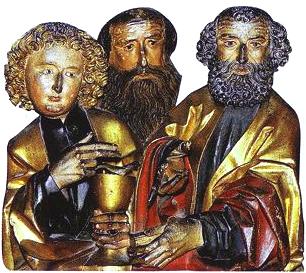Luke 6:12-36
Lesson 116
Lesson 116
Read both the "King James Bible" and the "New Living Translation."
In this lesson:
Jesus heals the diseased, and the possessed.
The Sermon on the Plain (6:20).
Four Beatitudes.
Jesus on patience, kindness, mercy, and loving your enemies.
Jesus heals the diseased, and the possessed.
The Sermon on the Plain (6:20).
Four Beatitudes.
Jesus on patience, kindness, mercy, and loving your enemies.
The apostle's Paul, Andrew, and John.
Study Tip:
Find the truth in each passage. Ponder how that truth is relevant to you. Decide how you can apply that truth into your life.
Find the truth in each passage. Ponder how that truth is relevant to you. Decide how you can apply that truth into your life.
Who was -
Thomas -
One of the original twelve disciples (Matthew 10:2-3), also called Didymus (Greek for twin). Despite saying he was willing to die with Jesus (John 11:16), Thomas fled with everyone else when Christ was arrested (Matthew 26:56; Mark 14:50). When the other disciples told Thomas that they had seen the resurrected Jesus, Thomas didn't believe them (John 20:24-25). This is where the term "Doubting Thomas" comes from. Eight days later Thomas saw Jesus and was invited to place his finger inside His wounds (John 20:26-29). Thomas saw Jesus a second time on the Sea of Galilee (John 21:1-2). After that, he became a faithful servant helping to spread Christianity. Today, the Christians of Malabar,
India regard Thomas as the founder of their church and call themselves the "Thomas Christians."
Judas -
Also called Jude, Juda, or Judas Lebbaeus surnamed Thaddaeus (Matthew 10:3), he was one of the original twelve disciples. He was the author of "The General Epistle of Jude" (Jude 1:1) and brother to James the less (Acts 1:13). At first, Judas did not believe Jesus was the Messiah (Mark 6:3), but eventually, he became a follower. Some Bible scholars believe he founded the church in Edessa. Jesus had two disciples named Judas, this one and Judas Iscariot who betrayed Him (Luke 6:16; John 14:22).
Judas Iscariot -
The son of Simon Iscariot (John 6:71; 12:4; 13:2; 13:26) and another of the original twelve disciples (Matthew 10:4; Mark 3:19; Luke 6:16). Iscariot is Hebrew for "man of Kerioth," a town in southern Judea. Judas is the only one of the twelve disciples who was not a Galilean. Judas was a thief (John 12:6) who joined Jesus and was put in charge of the group's finances (John 13:29). Jesus predicted that he would be betrayed (Matthew 26:21-25; John 6:70-71; 13:21), and soon after
Judas sold out the Messiah (Mark 14:10; Luke 22:3-4; John 13:2) for "thirty pieces of silver" (Matthew 26:14-16) and then committed suicide (Matthew 27:5) out of remorse. Whenever the Bible names the twelve disciples/apostles, Judas is always listed last (Matthew 10:2-4).
Thomas -
One of the original twelve disciples (Matthew 10:2-3), also called Didymus (Greek for twin). Despite saying he was willing to die with Jesus (John 11:16), Thomas fled with everyone else when Christ was arrested (Matthew 26:56; Mark 14:50). When the other disciples told Thomas that they had seen the resurrected Jesus, Thomas didn't believe them (John 20:24-25). This is where the term "Doubting Thomas" comes from. Eight days later Thomas saw Jesus and was invited to place his finger inside His wounds (John 20:26-29). Thomas saw Jesus a second time on the Sea of Galilee (John 21:1-2). After that, he became a faithful servant helping to spread Christianity. Today, the Christians of Malabar,
India regard Thomas as the founder of their church and call themselves the "Thomas Christians."
Judas -
Also called Jude, Juda, or Judas Lebbaeus surnamed Thaddaeus (Matthew 10:3), he was one of the original twelve disciples. He was the author of "The General Epistle of Jude" (Jude 1:1) and brother to James the less (Acts 1:13). At first, Judas did not believe Jesus was the Messiah (Mark 6:3), but eventually, he became a follower. Some Bible scholars believe he founded the church in Edessa. Jesus had two disciples named Judas, this one and Judas Iscariot who betrayed Him (Luke 6:16; John 14:22).
Judas Iscariot -
The son of Simon Iscariot (John 6:71; 12:4; 13:2; 13:26) and another of the original twelve disciples (Matthew 10:4; Mark 3:19; Luke 6:16). Iscariot is Hebrew for "man of Kerioth," a town in southern Judea. Judas is the only one of the twelve disciples who was not a Galilean. Judas was a thief (John 12:6) who joined Jesus and was put in charge of the group's finances (John 13:29). Jesus predicted that he would be betrayed (Matthew 26:21-25; John 6:70-71; 13:21), and soon after
Judas sold out the Messiah (Mark 14:10; Luke 22:3-4; John 13:2) for "thirty pieces of silver" (Matthew 26:14-16) and then committed suicide (Matthew 27:5) out of remorse. Whenever the Bible names the twelve disciples/apostles, Judas is always listed last (Matthew 10:2-4).




